Why do cats purr when you pet them?
Cats purr for three main reasons:
- Hunger
- Healing
- Stress relief
From an early age as a kitten, your cat will purr to encourage their mother to provide food. This persists in adulthood with their owner.
A purr is also used to help with relaxation and healing. The vibrations stimulate the healing and maintenance of bones and skin.
Purring also provides stress relief and comfort in a variety of situations, including giving birth.
Learn more in this article below.
My goal with this website is to help cat owners learn more about taking care of their cats. I am not a veterinarian and I recommend seeking the advice of a vet for any further questions.
Why Do Cats Purr?
Hunger
Yes, cats purr when they want food.
When a kitten is only days old, they will begin to purr as a way to help their mother locate them for feeding.
The scientific name for this type of purr is a solicitous purr and this purr triggers the owner or mother to respond.
The ‘feed me’ purr has an underlying high-frequency crying sound which has a similar effect to a baby crying.
This is your cat’s way of stating the case ‘Hey, I need food right now!’
Feeding your kittens or cats spaced meals is a healthy way to make sure they are happy.
Learn more:
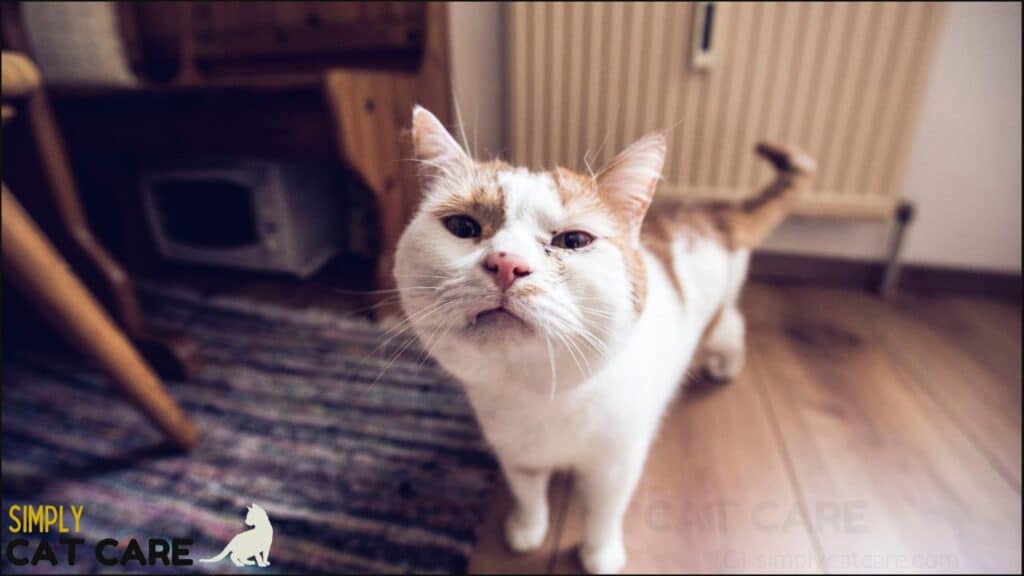
Healing
Purrs stimulate healing in the skin and muscles of your cat.
It turns out that the purrs vibrate in the 20-150hz range of sound frequency. This range can stimulate healing in the skin and soft tissue.
As cats spend a lot of time resting, the low-frequency purrs might be an energy-efficient way of maintaining strong bones whilst being inactive.
Researcher Dr. Elizabeth Von Muggenthaler believes the mechanism of purring is to reduce recovery time from wounds.
Exercise and general activity maintain strong muscles and bones.
When cats are spending a lot of time resting, purrs might be a form of ‘exercise’ that replaces movement.
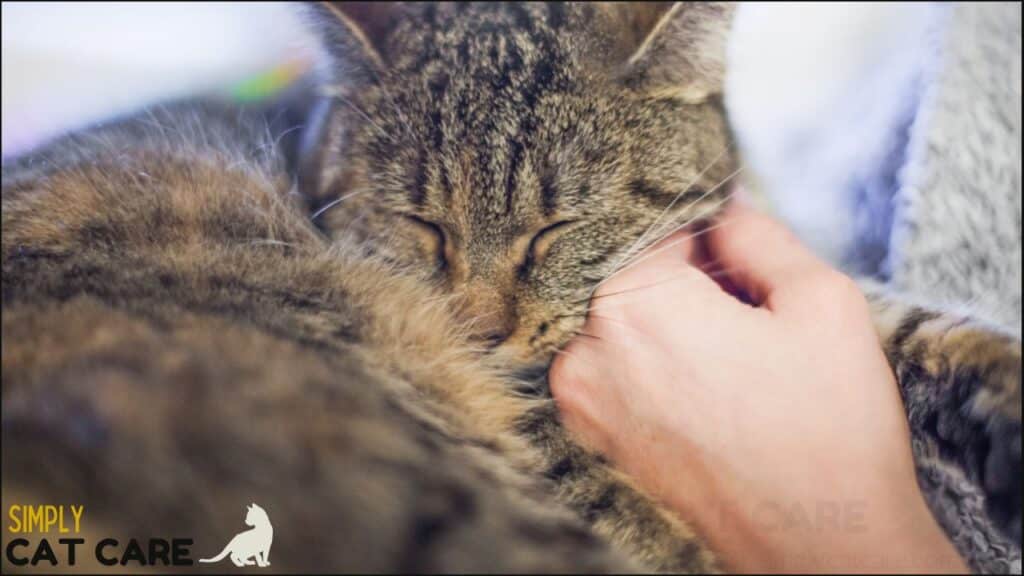
Stress RElief
Whilst purrs seem like a sign of happiness, they also help with pain and stress.
For example, when cats give birth they might start purring.
This may help in relaxing the cat and helping to provide relief from the stress of birth. When cats are in pain or nearing death, they may also purr for stress relief.
These low-frequency purring traits would have benefited cat ancestors in the wild.
The low frequencies would help the mammals to calm themselves in a variety of stressful situations.
Learn more:
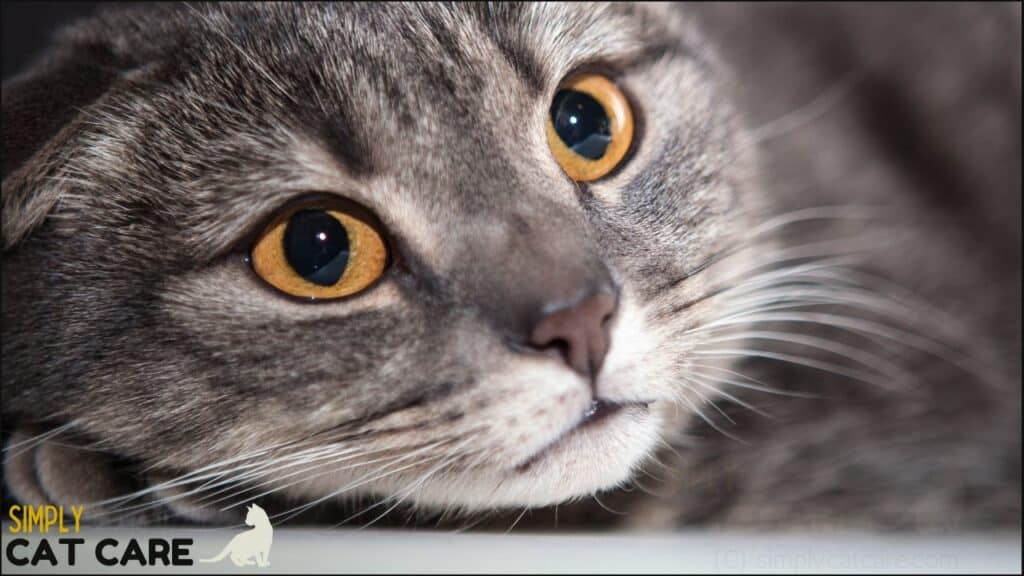
Frequently Asked Questions
How Do Cats Purr?
A cat purrs by breathing in air, which vibrates when the vocal cords are dilated.
Muscles within the cat larynx provide the basis for a purring sound.
When dilated, they tighten around the glottis which surrounds the vocal cords.
When a cat inhales and exhales it vibrates against the constricting vocal cords, creating a characteristic purr sound of a cat.
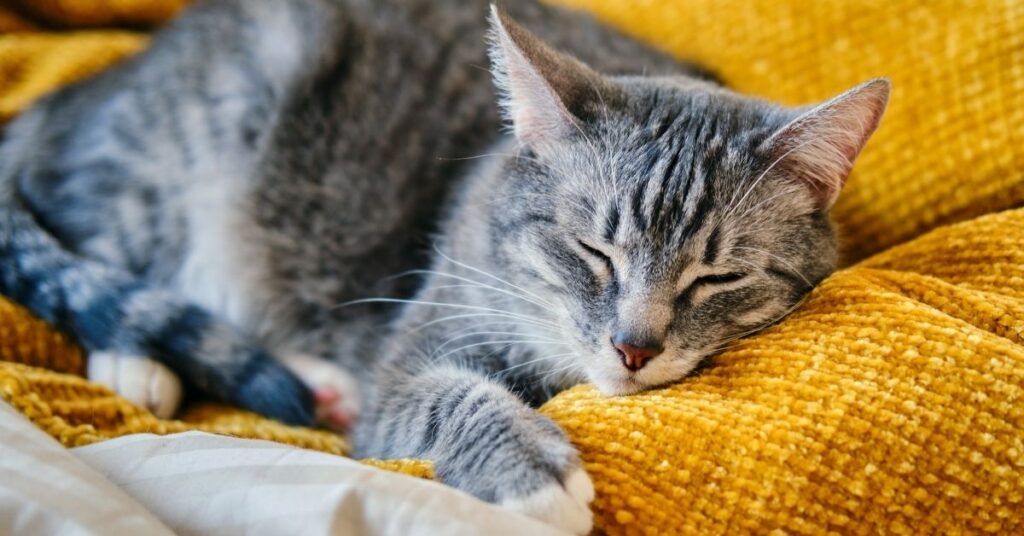
Can Cats Control Their Purring?
No.
A cat’s purr is an automatic response to a situation.
Cats purr based on external or internal stimulation. The purring results from activity in parts of the brain and central nervous system called neural oscillators.
Hunter, stress, and relaxation stimulate these systems and result in your cat purring without having to think about it.
Vibrations occur at a rate of 20-30 times per second.
Why Do Cats Purr?
Evolution.
Cat of the Felidae family tree of cats evolved purrs.
The Felidae evolutionary family includes the domestic cat, cheetahs, and cougars among others.
It is not known the exact reason why cats evolved purring, but other species like bears, foxes, rabbits, and guinea pigs create a purr-like sound.
Why Do Cats Purr but Not Lions or Tigers?
Evolution.
Lions and tigers are part of the Panathenaea family tree (big cats) which produces a roaring sound instead of a purring sound.
This means there was some evolutionary selection pressure that precipitated the emergence of a purr versus a roar in the wider cat family tree.
Our pets cannot roar which may be due to evolutionary differences in the larynx bones.
The hyoid bone is completely ossified in cats which forms part of the basis of producing a purring vibration.
The big cats of the Panathenaea family tree have a partially ossified hyoid bone, which creates a flexible structure that produces a loud range of roars.
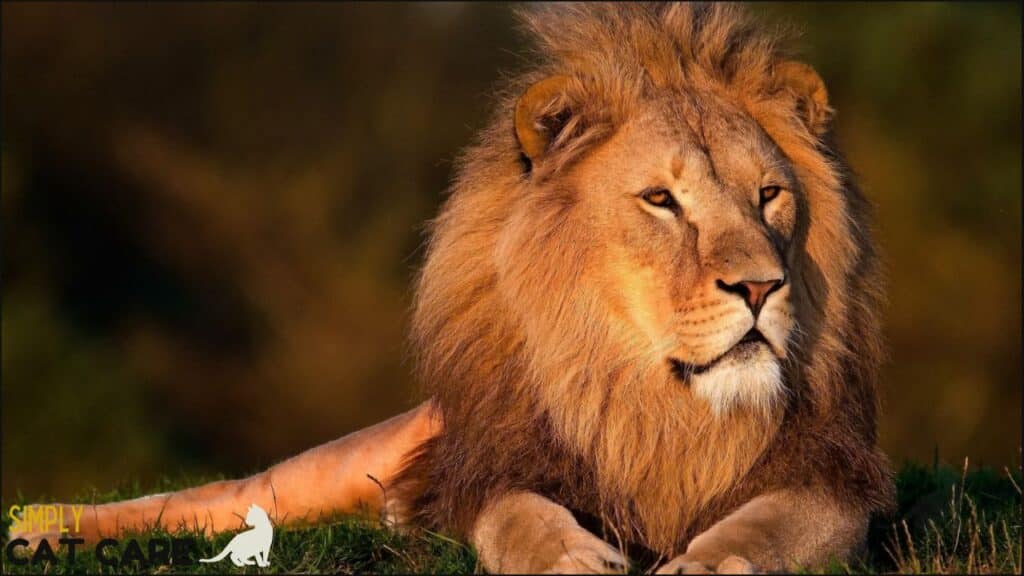
Why Can’t Dogs Purr?
Different species.
Cats and dogs are different species that evolved from different animal ancestors.
Dogs do not have the same structures around the larynx which produce purr sounds.
This might be because dogs benefit more from loud barking sounds to warn other animals.
Are Cats Happy When They Purr?
Unclear.
Cats purr even in stress or hunger, so it’s difficult to pin down the exact reason your cat is purring.
Many cat owners assume a purr as a sign your cat is happy.
The main science-based reasons cats purr are for healing and feeding purposes.
Cats may purr to improve the health of their owner but it’s unknown if this is consciously controlled (i.e. your cat is thinking about your health and using purrs to heal you).
Do Cats Improve the Health of Their Owner?
Maybe.
Owning a cat is good for your health. Research suggests that cat ownership can reduce the risk of death from stroke and heart disease by one-third.
Whilst the mechanism for this is speculative, purring could be one key to the benefit of calming us whilst sitting on our lap.
Whilst the solicitous high-pitched purr that signals to feed triggers a response to take action, a calming purr might produce a therapeutic response.
So go ahead, grab a cat and let the purrs work their magic.
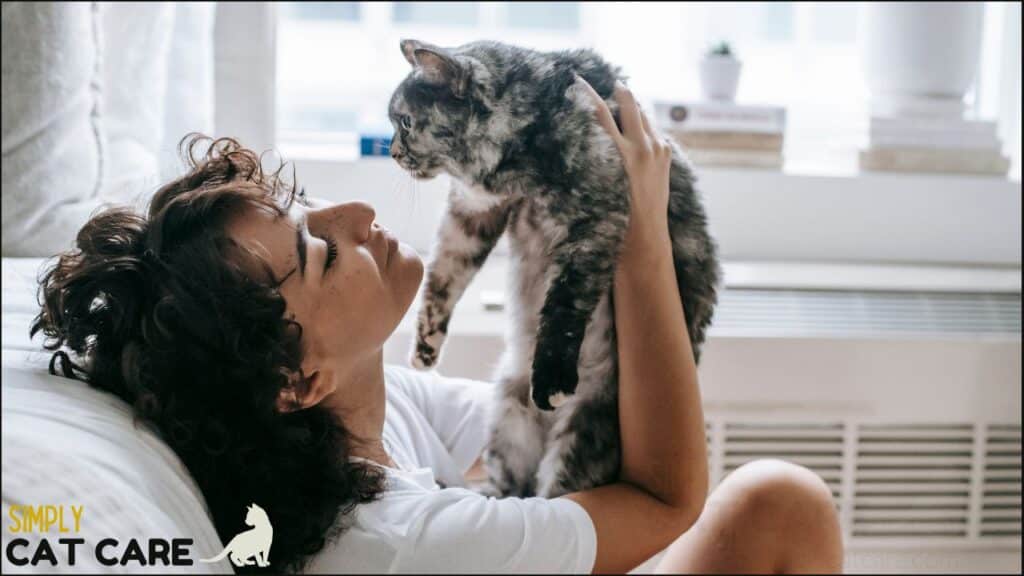
Why Do Cats Purr When You Pet Them?
Petting your cat helps them reach a relaxed state.
As you’ve learned, this is helpful for healing.
Does this mean cats are always happy when purring?
It depends.
Healing occurs in times of pain as well as pleasure. For example, even cats that are in serious pain may purr to help with stress relief.
Although this is less likely, it is important to note that purring doesn’t always mean a happy cat.
Purring is also a form of language for cats.
Cats purr when they want food. If your cat starts purring when petting them, they might just be hungry and ready to eat.
Look out for your cat’s tail upright and vibrating. Cats may do this when they want to eat.
Your furry friend will also use purring whilst relaxing and staring at you with eyes half-closed. That’s more of a sign your cat is healing and resting.
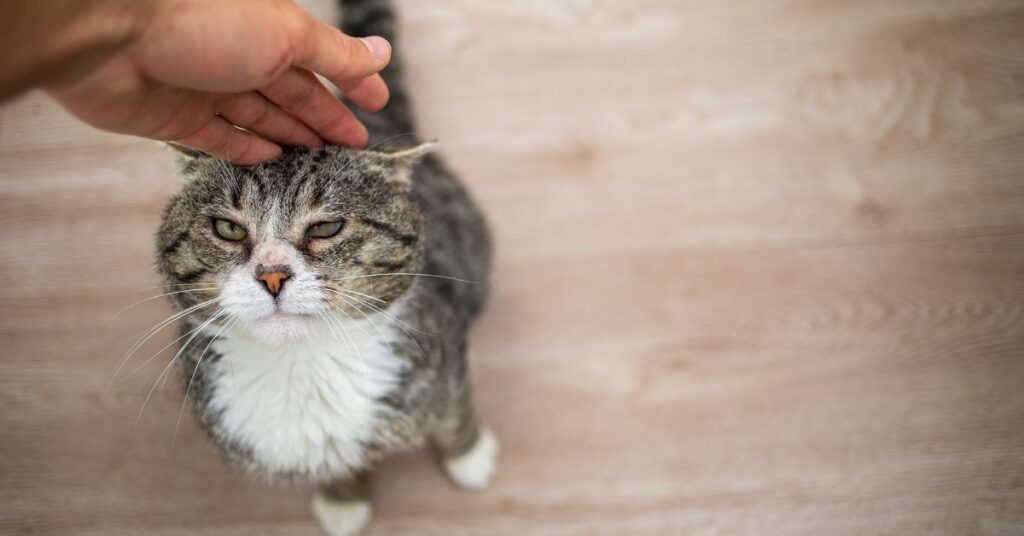
Why Does My Cat Purr So Loud When I Pet Him?
Loud purrs may be a sign of pain.
If you notice a change in your cat’s mood then they may be in pain.
Examples of pain include:
- Growling
- Sensitive to touch
- Lethargic movement
- Coughing
Learn more:
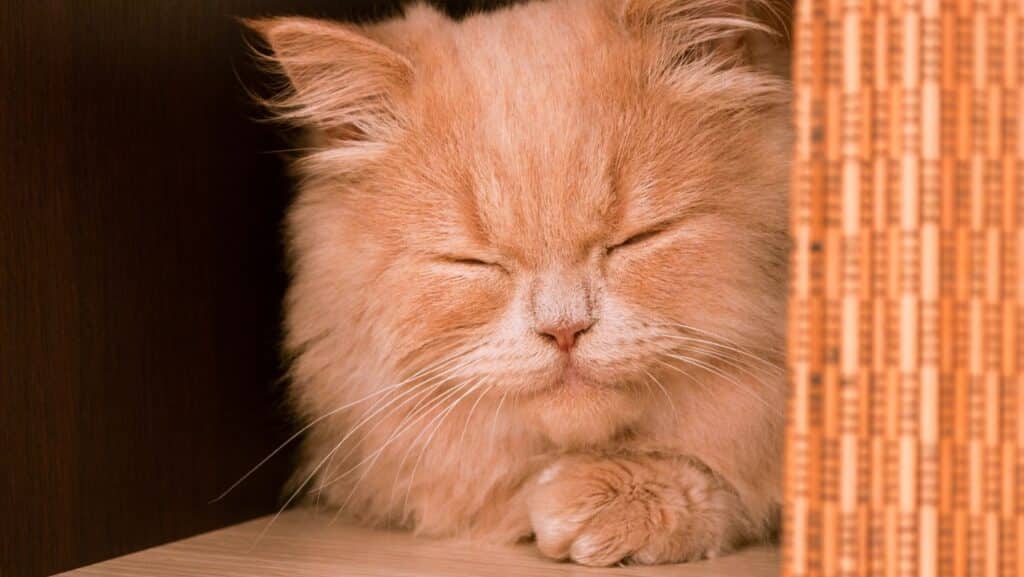
Is Purring a Sign of Affection?
Maybe.
Check your cat’s body language. This shows whether they are content, or purring from stress.
Signs of affection and contentment include:
- Upwards pointed ears
- Stretched out tail
- Closed eyes
Research suggests that cat ownership can reduce the risk of death from stroke and heart disease by one-third.
Whilst the mechanism for this is speculative, purring could be one key to the benefit of calming us.
Cats make us healthier and may purr to keep us happy. So go ahead, grab a cat and let the purrs work their magic.
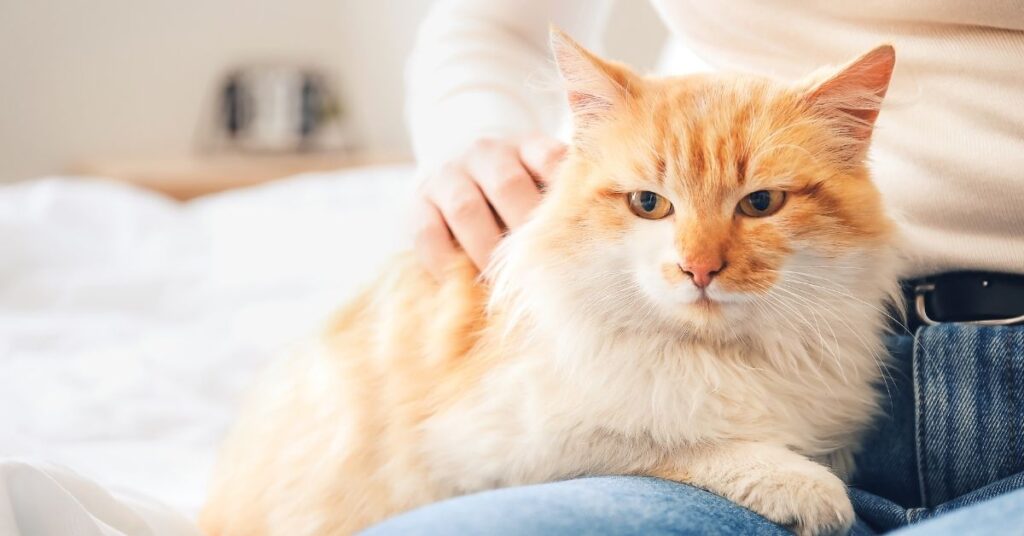
Why Do Cats Purr and Then Bite You?
Biting is a sign of discomfort.
Remember:
Cats purr for healing. They purr in reaction to stressful situations.
Look for the signs of aggression. This includes things like:
- Swishing tail
- Slanted eyes
- Crouched position
- Hissing
- Fur standing on end
Sometimes whilst grooming, cats may nibble you as well. This isn’t a problem as long as you aren’t getting hurt.
Always pay close attention to all body language cues to understand your cat.
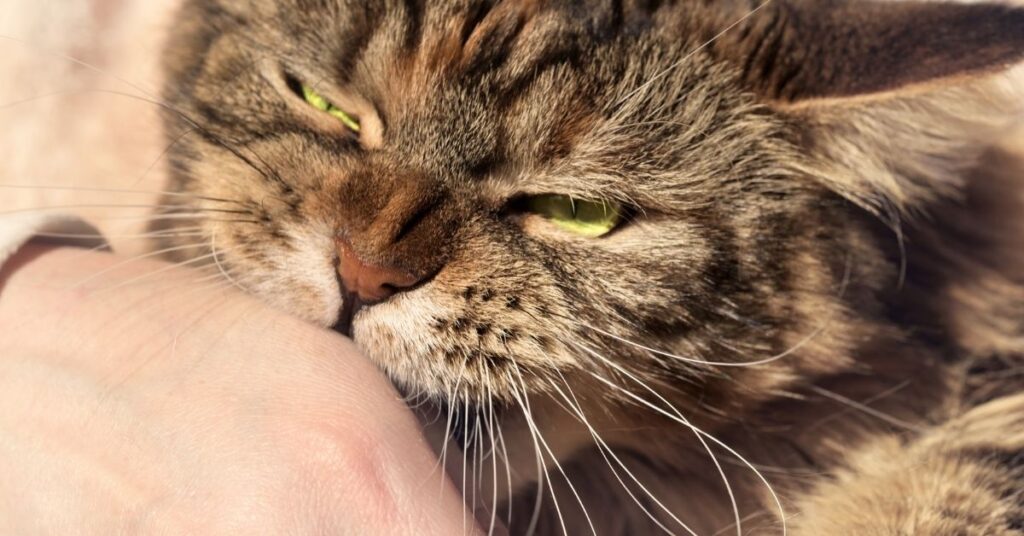
Conclusion
Cats purr for three main reasons:
- Alerting their owner or mother that they want to be fed (solicitous purr)
- Healing
- Stress relief
Many cat owners assume a purr as a sign your cat is happy. However, the main science-based reasons cats purr are for healing and feeding purposes.
A group of muscle structures surrounding the cat larynx provides the basis for a purring sound. When dilated, they tighten around the glottis which surrounds the vocal cords.
Cats make a lot of interesting noises for communication, and purring is one of them.
Learn more:
